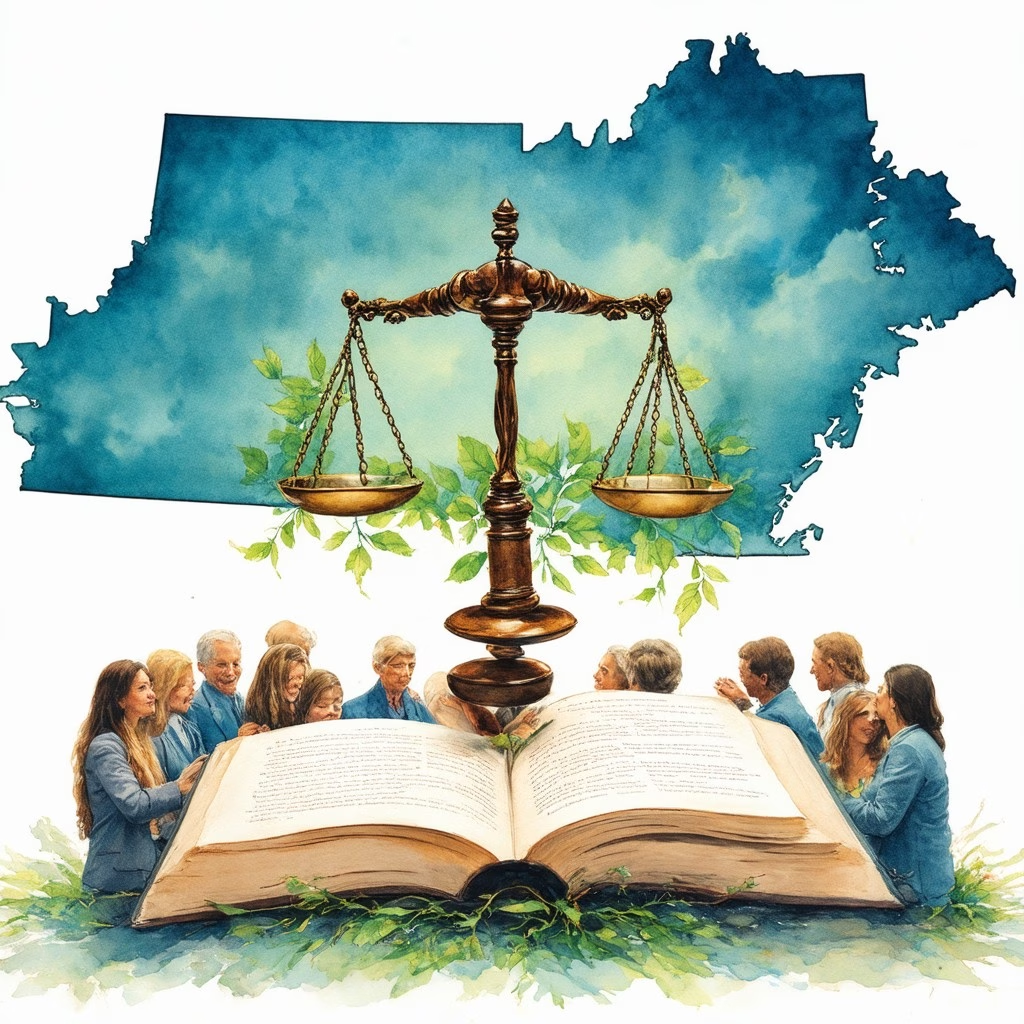Key Takeaways
- Discover how to get free legal help through local legal aid organizations and pro bono services in Kentucky and Indiana.
- Understand the eligibility criteria for legal aid, which typically requires meeting income thresholds based on federal poverty guidelines.
- Access immediate support via a free legal advice hotline 24/7 to connect with legal professionals for urgent assistance.
- Learn the steps to request a free lawyer in Kentucky, including contacting legal aid and undergoing an initial evaluation.
- Explore community organizations and resources that provide targeted legal assistance for issues like family law and housing disputes.
- Utilize online directories and local bar associations to locate pro bono lawyers who can offer free legal services.
Are you wondering, how do I get free legal help? Navigating the complexities of the legal system can be daunting, especially when financial constraints make hiring a lawyer seem impossible. In this comprehensive guide, we will explore essential insights into legal aid eligibility and the various resources available in Kentucky and Indiana. From understanding what it means when you can’t afford a lawyer to accessing a free legal advice hotline 24/7, we will provide you with the information you need to secure the legal support you deserve. Additionally, we will delve into the costs associated with legal aid, how to find pro bono lawyers near you, and tips for responding to legal challenges without representation. Whether you’re facing family law issues or seeking community organizations offering free legal help, this article will equip you with the knowledge to navigate your legal journey effectively.
How do I get free legal help?
Accessing free legal help is essential for individuals who cannot afford a lawyer. Understanding the terminology and resources available can significantly aid in navigating the legal landscape. Here’s a breakdown of key terms and options for obtaining legal assistance.
What is it called when you can’t afford a lawyer?
When you can’t afford a lawyer, several terms and resources come into play:
- Indigent: This term refers to individuals who lack sufficient financial resources to pay for legal services. Indigency is often determined by income and asset levels.
- Public Defender: In criminal cases, if you cannot afford a private attorney, the court will appoint a public defender. Public defenders are government-funded lawyers who provide legal representation to those unable to pay for their defense.
- Legal Aid: Legal aid organizations offer free or low-cost legal assistance to individuals who meet specific income criteria, primarily focusing on civil matters such as housing, family law, and public benefits. For example, the Legal Services Corporation (LSC) is a national organization that funds legal aid programs across the United States.
- Pro Bono: Pro bono services are provided by lawyers who volunteer their time to assist individuals in need without charging fees. Many law firms and individual attorneys participate in pro bono work to support community welfare.
- Legal Aid Organizations: Numerous nonprofit organizations provide legal assistance to low-income individuals. These organizations often focus on specific issues, such as domestic violence, immigration, or tenant rights. Examples include the American Civil Liberties Union (ACLU) and local legal aid societies.
- Resources for Assistance: Websites like LawHelp.org offer valuable information on finding free or low-cost legal help in various states. Additionally, the American Bar Association provides resources and directories to locate legal aid services.
For those seeking legal assistance, it’s crucial to explore these options to ensure access to justice, regardless of financial status.
Free legal advice hotline 24/7: How to access immediate support
If you need immediate legal assistance, a free legal advice hotline can be a valuable resource. Many organizations offer 24/7 hotlines where you can speak with legal professionals who can provide guidance on various issues. To access these services:
- Search for local legal aid organizations that operate hotlines. Many states have dedicated services that can connect you with a lawyer.
- Utilize online resources to find hotlines specific to your legal needs. For example, the Legal Services Corporation provides information on available hotlines across the country.
- Consider subscribing to legal aid services that offer API access for real-time assistance and information on legal rights and resources.
These hotlines are designed to help individuals navigate their legal challenges effectively, ensuring that everyone has access to the support they need, regardless of their financial situation.

Understanding Legal Aid Eligibility
When seeking free legal help, understanding the eligibility criteria for legal aid is crucial. Legal aid programs are designed to assist individuals who cannot afford legal representation, but the specific requirements can vary significantly based on income, household size, and the nature of the legal issue. Knowing these details can help you determine if you qualify for assistance.
What is the maximum income to qualify for legal aid?
The maximum income to qualify for legal aid varies based on federal poverty guidelines and the specific Legal Aid organization. Here are the key thresholds:
- 125% of Federal Poverty Guidelines: This is the most common income threshold used by Legal Aid organizations funded by the Legal Services Corporation (LSC). For example, in 2023, this equates to an annual income of approximately $17,000 for an individual and $35,000 for a family of four.
- 200% of Federal Poverty Guidelines: Some Legal Aid organizations may have more flexible income rules, allowing assistance to individuals and families with incomes up to 200% of the federal poverty level. This translates to about $27,000 for an individual and $55,000 for a family of four in 2023.
- Variable Income Limits: Specific income limits can vary depending on the Legal Aid organization and the type of legal case. Certain organizations may consider additional factors such as household size, expenses, and the nature of the legal issue.
For the most accurate and up-to-date information, individuals should consult the Legal Aid organization in their area or visit the Legal Services Corporation website. Additionally, resources like Gov Guider can provide guidance on eligibility and available services.
Who is eligible for legal services in Indiana?
In Indiana, eligibility for legal services is primarily determined by income and the type of legal issue. Generally, individuals and families who meet the following criteria may qualify for legal aid:
- Individuals with incomes at or below 125% of the federal poverty level.
- Residents of Indiana facing civil legal issues, such as housing disputes, family law matters, or consumer issues.
- Those who are elderly, disabled, or veterans may receive priority in certain cases.
To apply for legal aid in Indiana, you can contact local legal aid offices or visit the Gov Guider for more information on available resources. Understanding your eligibility can empower you to access the legal support you need.
Finding Free Legal Resources
Accessing free legal resources is crucial for individuals who cannot afford legal representation. In Kentucky, there are several avenues to explore when seeking a free lawyer. Understanding the steps involved can significantly ease the process and ensure you receive the assistance you need.
How do I ask for a free lawyer in Kentucky?
To request a free lawyer in Kentucky, follow these steps:
- Contact Legal Aid: Call the Kentucky Legal Aid at 1-866-452-9243 or visit their website. They provide free legal assistance to low-income individuals.
- Initial Evaluation: During your call, you will undergo an initial evaluation where you will need to provide financial information about your household. This helps determine your eligibility for free legal services.
- Speak with a Legal Advocate: After the evaluation, you will be connected with a legal advocate who will discuss your case and provide guidance on the next steps.
- Explore Additional Resources: You can also check the Kentucky Bar Association’s website for more resources or local pro bono programs that may offer free legal services.
- Consider Gov Guider: For further assistance, you may explore Gov Guider, which can help you navigate legal resources available in Kentucky.
Pro bono lawyers near me: Locating assistance in your area
Finding pro bono lawyers in your area can be a straightforward process if you know where to look. Here are some effective strategies to locate pro bono legal assistance:
- Local Bar Associations: Many local bar associations maintain lists of attorneys who offer pro bono services. Check the American Bar Association for resources specific to your state.
- Legal Services Corporation: Visit the Legal Services Corporation website to find legal aid organizations that provide free or low-cost legal services in your area.
- Online Directories: Utilize online legal directories such as Nolo, which can help you find pro bono lawyers based on your location and legal needs. Visit Nolo for more information.
- Community Organizations: Many community organizations offer legal assistance or can connect you with pro bono lawyers. Look for local nonprofits that focus on legal aid.
Costs Associated with Legal Aid
Understanding the costs associated with legal aid is crucial for anyone seeking free legal help. While many legal aid organizations provide services at no charge, there are instances where minimal fees may apply. Knowing what to expect can help you navigate the process more effectively.
How much does legal aid charge?
Legal aid organizations typically do not charge for their services, especially for low-income individuals. However, some may have nominal fees for specific services or require clients to contribute based on their income level. It’s essential to inquire about any potential costs upfront when seeking assistance. For example, in some cases, clients might be asked to pay for court filing fees or other related expenses. Always clarify these details during your initial consultation to avoid surprises.
Free lawyer consultation over the phone: What to expect
If you’re considering reaching out for a free lawyer consultation over the phone, it’s a straightforward process designed to assess your legal needs. Here’s what you can typically expect:
- Initial Assessment: The attorney will ask questions about your legal issue to determine if they can assist you.
- Eligibility Check: You may be asked about your income and residency to confirm your eligibility for free legal services.
- Advice and Guidance: The attorney will provide initial legal advice and outline potential next steps, including whether you need to schedule a follow-up meeting.
- Confidentiality: All discussions during the consultation are confidential, allowing you to speak freely about your situation.
For immediate support, consider utilizing a free legal advice hotline 24/7. These hotlines can connect you with legal professionals who can provide guidance at any time.

Navigating Family Law Issues
When facing family law issues, securing free legal assistance can be crucial. Many individuals wonder, how to get a free lawyer for family court? Fortunately, there are several resources available to help you access the legal support you need without incurring costs.
How to get a free lawyer for family court?
To obtain a free lawyer for family court, start by reaching out to local legal aid organizations. These organizations specialize in providing free legal help to individuals who cannot afford an attorney. Legal aid services typically do not charge clients for their assistance, as they are designed to provide free legal help to individuals who cannot afford to hire a lawyer. Many legal aid offices offer self-help resources, including legal forms, guides, and workshops, which can empower individuals to navigate their legal issues independently.
Additionally, consider contacting pro bono programs in your area. Many law firms and attorneys offer pro bono services, meaning they provide legal assistance at no cost to clients who qualify based on income or specific legal needs. You can find pro bono resources through the American Bar Association or by searching for local legal clinics that focus on family law.
Resources for free legal advice Michigan online
If you’re in Michigan and need free legal advice, there are several online resources available. Websites like Legal Services Corporation provide directories of legal aid organizations that can assist you. Additionally, the Michigan Legal Help website offers a wealth of information and resources tailored to individuals seeking legal assistance in family law matters.
For immediate support, you can also access a free legal advice hotline 24/7. These hotlines connect you with legal professionals who can provide guidance and answer your questions regarding family law issues. Utilizing these resources can help you understand your rights and options as you navigate your legal challenges.
Responding to Legal Challenges
What happens if someone sues me and I can’t afford a lawyer?
If you find yourself being sued and cannot afford a lawyer, it’s essential to understand your options and the steps you can take to respond effectively:
- Understand Your Situation: Being sued can be daunting, especially if you lack financial resources. It’s crucial to assess the nature of the lawsuit and the potential consequences. Many creditors may settle for a lower amount if they realize you have limited means.
- Negotiate with the Plaintiff: Often, companies or individuals suing for debts may be willing to negotiate a settlement. They may accept a smaller payment plan or a lump sum that is less than the total amount owed. This is particularly true if you have no assets, as they may prefer to recover something rather than risk going to court.
- Seek Legal Aid: Many states offer free or low-cost legal aid services for individuals who cannot afford representation. Organizations like the Legal Services Corporation (LSC) provide resources to help you find legal assistance in your area. You can also check local law schools, which often have clinics where law students provide free legal help under supervision.
- Consider Self-Representation: If you cannot secure a lawyer, you may represent yourself in court. This is known as “pro se” representation. While it can be challenging, many courts provide resources and guidance for self-represented litigants. Familiarize yourself with court procedures and relevant laws to strengthen your case.
- Explore Bankruptcy Options: If the lawsuit is related to overwhelming debt, filing for bankruptcy may be a viable option. Bankruptcy can provide relief from debts and stop lawsuits. However, it is essential to understand the implications and long-term effects of bankruptcy on your financial future.
- Utilize Online Resources: Websites like Nolo and American Bar Association offer valuable information on legal rights and procedures. These resources can help you understand your options and prepare for court.
- Stay Informed: Keep track of all court dates and documents related to your case. Ignoring a lawsuit can lead to a default judgment against you, which can have serious financial consequences.
Steps to take when facing legal action without representation
When facing legal action without representation, follow these steps to ensure you are adequately prepared:
- Gather Documentation: Collect all relevant documents related to the lawsuit, including any notices, contracts, or correspondence. This information will be crucial in understanding your case.
- Research Your Legal Rights: Familiarize yourself with the laws applicable to your situation. Understanding your rights can empower you to make informed decisions.
- Contact a Free Legal Advice Hotline 24/7: Many organizations offer free legal advice hotlines that can provide immediate support and guidance. Utilizing these resources can help clarify your options and next steps.
- Prepare Your Defense: If you choose to represent yourself, outline your defense strategy. Identify key points you want to present and gather evidence to support your claims.
- Attend All Court Hearings: Make sure to attend all scheduled court hearings. Failing to appear can result in a default judgment against you.
- Consider Mediation: In some cases, mediation can be an effective way to resolve disputes without going to trial. This process involves a neutral third party who can help facilitate a settlement.
Additional Resources and Support
Community organizations offering free legal help
When seeking free legal help, community organizations can be invaluable resources. Many local nonprofits and legal aid societies provide assistance to individuals who cannot afford legal representation. These organizations often focus on specific areas of law, such as family law, housing, or immigration. For instance, the Legal Services Corporation offers a directory of legal aid programs across the United States, making it easier to find help in your area. Additionally, local bar associations frequently have pro bono programs that connect individuals with volunteer attorneys willing to provide free legal services.
Tips for utilizing subscribed legal aid services via API
Utilizing subscribed legal aid services can enhance your access to legal resources. Many organizations now offer APIs that allow users to connect with legal information and services seamlessly. Here are some tips for making the most of these services:
- Understand the API’s capabilities: Familiarize yourself with the features offered, such as access to legal documents, case law, or attorney directories.
- Stay updated: Subscribe to newsletters or alerts from these services to receive the latest information on legal aid and resources.
- Utilize support resources: Many services provide tutorials or customer support to help you navigate their platforms effectively.
- Combine resources: Use the API in conjunction with community organizations to maximize your legal support network.




